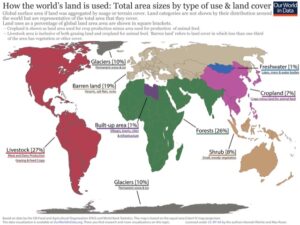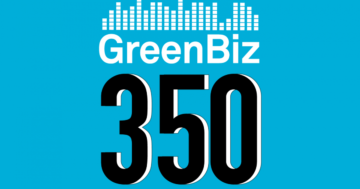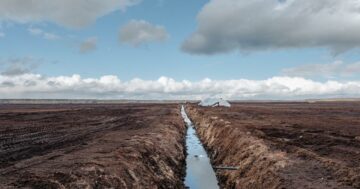
I once heard a longtime attendee of the Conference of Parties, convened annually to negotiate national climate policies, describe the gatherings as one room (the actual delegates) working to set rules on climate and another room (the rest of the stakeholders in town) preparing how to best game them.
It’s a cynical take but not unwarranted.
Last year’s COP27 hosted more oil and gas lobbyists — serving industries that still have huge financial incentives to stick with their core polluting products — than representatives from any national delegation, except the United Arab Emirates, which is now COP28’s host.
Consider that COP28’s president, Sultan Al Jaber, has a professional mandate as CEO of the Abu Dhabi National Oil Company to “focus on exploring the UAE’s undeveloped oil and gas.”
It’s a stark misalignment with both COP21’s Paris Agreement goal of encouraging policies to hold climate change below a 1.5 degrees Celsius global temperature rise and the International Energy Agency’s call for the world to halt new fossil fuel supply development if we’re to reach net zero by mid-century.
Climate finance — the flow of funds to the activities or projects intended to help address climate change mitigation and adaptation — is high on the COP28 Action Agenda. A stated goal is “fixing climate finance.”
Promises made, promises broken
What’s broken? Most notably, the promise developed countries made in 2009 to allocate $100 billion annually to support developing countries in reducing their emissions and adapting to climate change, beginning in 2020 via both public and private mechanisms.
But a successful transition to a clean and just economy will require a whole systems approach, not additions or tweaks to line items. The financial system’s contribution to the ongoing climate crisis isn’t a matter of a leaky sink, but rather a matter of broken plumbing.
The hyperfocus during the COP process on a single number — an annual $100 billion from developed to developing countries — has taken up much of the oxygen that could be used to get on with addressing the breakdowns in the current financial system.
Nina Seega, director of Cambridge University’s Center for Sustainable Finance, put it this way: “We can argue over who is most to blame and who should pay for the damage caused … Politicians and the private sector need to stop bickering and agree on a direction of travel. They need to agree that the transition to a clean, more sustainable economy and society is happening, and consent to phase out fossil fuels and shift financial flows away from oil, coal and gas and towards cleaner solutions.”
Brutal honesty and the bottom line
Climate finance is deeply in need of concrete definitions.
Consider this: Projects for financing a coal plant in Bangladesh, chocolate stores in Asia and an airport expansion in Egypt have all been reported to the United Nations by developed countries as actions toward their national climate finance goals.
Given the lack of concrete guidance from the United Nations about what is or is not climate finance, no rules were broken in doing so.
As the undersecretary for the Philippines Department of Finance told Reuters, “This is the wild, wild west of finance. Essentially, whatever they call climate finance is climate finance.”
To get started on fixing that oversight, Seega, who also sits on the sustainable finance advisory panel at the Monetary Authority of Singapore and the sustainable finance scientific council at S&P Ratings, offers two concrete steps to United Nations delegates.
First, financiers should support the adoption of the “do no significant harm” principle across all financial flows. The principle’s criteria is to ensure an activity deemed “sustainable” does not have adverse effects on other environmental objectives.
And second, Paris Agreement signatory countries should adopt a single global taxonomy, as opposed to building more regional taxonomies such as the European Union’s taxonomy for sustainable activities.
Being brutally honest would require recognition that over many decades, the COP process hasn’t quite worked. Despite a dubious setting for COP28, is there still hope that the nations of the world and the private sectors can get things done on climate finance in Dubai?
- SEO Powered Content & PR Distribution. Get Amplified Today.
- PlatoData.Network Vertical Generative Ai. Empower Yourself. Access Here.
- PlatoAiStream. Web3 Intelligence. Knowledge Amplified. Access Here.
- PlatoESG. Carbon, CleanTech, Energy, Environment, Solar, Waste Management. Access Here.
- PlatoHealth. Biotech and Clinical Trials Intelligence. Access Here.
- Source: https://www.greenbiz.com/article/cop28-will-be-make-or-break-moment-climate-finance
- :has
- :is
- :not
- ][p
- $UP
- 1
- 2020
- 7
- a
- About
- abu dhabi
- AC
- across
- Action
- actions
- activities
- activity
- actual
- adaptation
- additions
- addressing
- adopt
- Adoption
- adverse
- advisory
- agenda
- Agreement
- airport
- AL
- All
- allocate
- also
- an
- and
- annual
- Annually
- any
- approach
- Arab
- Arab Emirates
- argue
- article
- AS
- asia
- At
- attendee
- authority
- away
- Bangladesh
- bbc
- BE
- been
- Beginning
- below
- BEST
- Billion
- Bloomberg
- both
- Bottom
- Broken
- Building
- but
- by
- call
- cambridge
- CAN
- Can Get
- caused
- Celsius
- Center
- ceo
- change
- Chocolate
- cleaner
- Climate
- Climate change
- climate crisis
- Coal
- company
- Conference
- consent
- contribution
- cop28
- Core
- could
- Council
- countries
- crisis
- criteria
- Current
- damage
- decades
- deemed
- definitions
- delegates
- delegation
- Department
- describe
- Despite
- developed
- developing
- Developing Countries
- Development
- Dhabi
- direction
- Director
- do
- does
- doing
- done
- Dubai
- during
- EC
- economy
- effects
- Egypt
- emirates
- Emissions
- encouraging
- energy
- ensure
- environmental
- ESG
- essentially
- Europa
- European
- Except
- expansion
- finance
- financial
- financial system
- financing
- flow
- Flows
- Focus
- For
- fossil
- Fossil fuel
- fossil fuels
- Free
- from
- Fuel
- fuels
- funds
- game
- GAS
- gatherings
- get
- Global
- goal
- Goals
- Green
- Green Finance
- guidance
- Happening
- harm
- Have
- heard
- High
- hold
- hope
- host
- hosted
- How
- How To
- HTTPS
- huge
- if
- in
- Incentives
- industries
- intended
- International
- issues
- items
- jpg
- just
- Lack
- Line
- lobbyists
- made
- mandate
- many
- Matter
- mechanisms
- mitigation
- moment
- Monetary
- monetary authority
- Monetary Authority of Singapore
- more
- most
- much
- National
- Nations
- Need
- net
- New
- news
- Newsletter
- no
- node
- notably
- now
- number
- objectives
- of
- Offers
- Oil
- Oil and Gas
- on
- once
- ongoing
- opposed
- or
- Other
- our
- out
- over
- Oversight
- Oxygen
- panel
- paris
- Paris Agreement
- parties
- Pay
- phase
- Philippines
- plato
- Plato Data Intelligence
- PlatoData
- policies
- Politicians
- preparing
- president
- private
- private sector
- process
- Products
- professional
- projects
- promises
- public
- rather
- ratings
- reach
- recognition
- reducing
- regional
- Reported
- Representatives
- require
- REST
- Reuters
- Rise
- rules
- s
- S&P
- scientific
- Second
- sector
- Sectors
- serving
- set
- setting
- shift
- should
- signatory
- significant
- Singapore
- single
- sits
- So
- Society
- Solutions
- stakeholders
- stark
- started
- stated
- Steps
- Stick
- Still
- Stop
- stores
- successful
- such
- sultan
- supply
- support
- sustainable
- system
- Systems
- Take
- taken
- taxonomy
- than
- that
- The
- The Philippines
- the world
- their
- Them
- There.
- they
- things
- this
- to
- toward
- towards
- town
- transition
- travel
- tweaks
- two
- UAE
- United
- United Arab Emirates
- united nations
- used
- via
- Way..
- we
- weekly
- were
- West
- What
- What is
- whatever
- which
- WHO
- whole
- Wild
- wild west
- wild west of finance
- will
- with
- worked
- working
- world
- would
- zephyrnet
- zero











